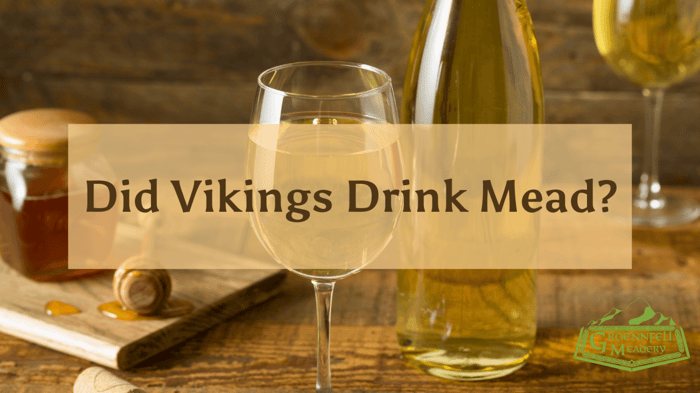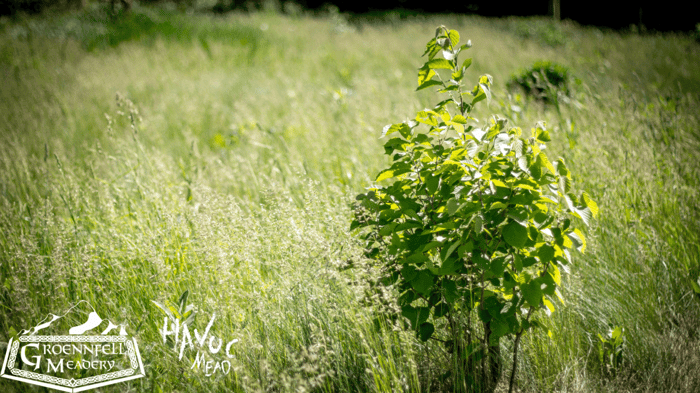Believe it or not, there is one question that brings a LOT of people to our website: did Vikings really drink mead?
There's probably a good reason why: plenty of people still think Vikings wore horned helmets (they didn't) or were filthy barbarians (they were some of the cleanest folk of their time!). So it tracks that maybe, just maybe the beverage they are most well-known for is also a myth.
Let's find out!
Did Vikings Drink Mead?
Yes, of course, they did!
Good article! We can all go home.
OK, but yes, those aren't just stories. Mead is, after all, a very ancient drink and known in many cultures all over the world, since long before the days of the Vikings. The oldest archeological evidence of mead actually comes from the Henan province in Northern China - and it dates back to about 7000 BC!
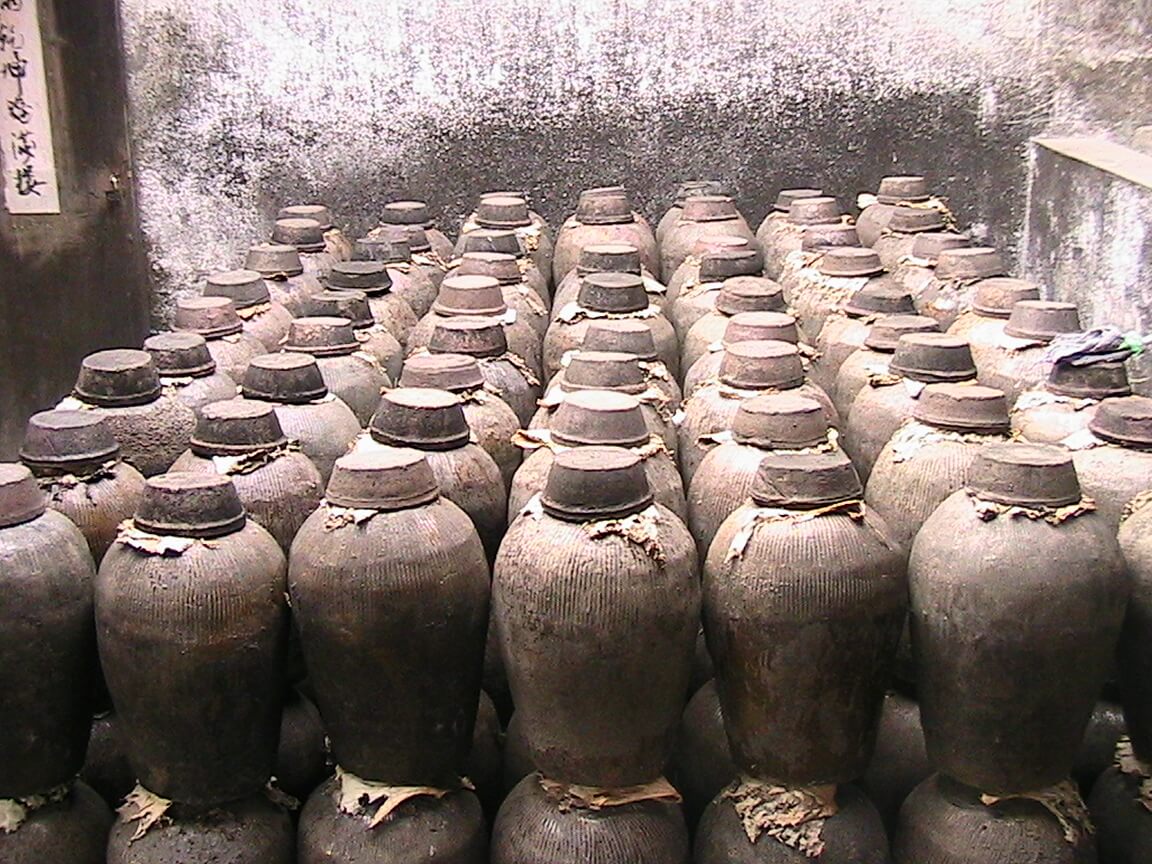
(These are jugs of Baijiu, a type of Chinese rice wine, which is also ancient but was more popular in Ancient China than mead.)
(Oh, and here's another myth for you: Vikings didn't really drink mead out of the skulls of their enemies. Human skulls have a lot of holes in them and generally don't make great drinking vessels! That myth finds its origin in a mistranslation of a Norse kenning (or poetic phrase): '...drink beer at once from the curved branches of skulls.' They did, however, drink from the hollow horns of animals, which is what 'the curved branches of skulls,' is referring to! Unless the #1 enemy of the great Viking was a bull...)
How Do We Know that Vikings Drank Mead?
Anywhere there are bees that make honey, there is some kind of mead being made by humans. We just love to ferment stuff!
How do we know that they drank mead? They wrote about it:
"I have never seen Mead enjoyed more in any hall on earth." - from the Anglo-Saxon poem, Beowulf
"Robbed of strength, Reckless of speech,
a man knows no power Overhands, feet,
mind. Who am I who bind Men on Middle-earth,
blinding with rage? Fools know my dark power by daylight." - Riddle 25 from the Exeter Book, which details the collection of honey from the forest to make mead.
“When the Æsir saw Odin flying, they placed their vats in the courtyard, and when Odin entered Asgard he spat the mead into the vats. It was such a close call, with Suttung almost catching him, that he blew some of the mead out of his rear. No one paid attention to this part, and whoever wanted it took it; we call this the bad poets’ portion.” - Snorri Sturluson, The Prose Edda
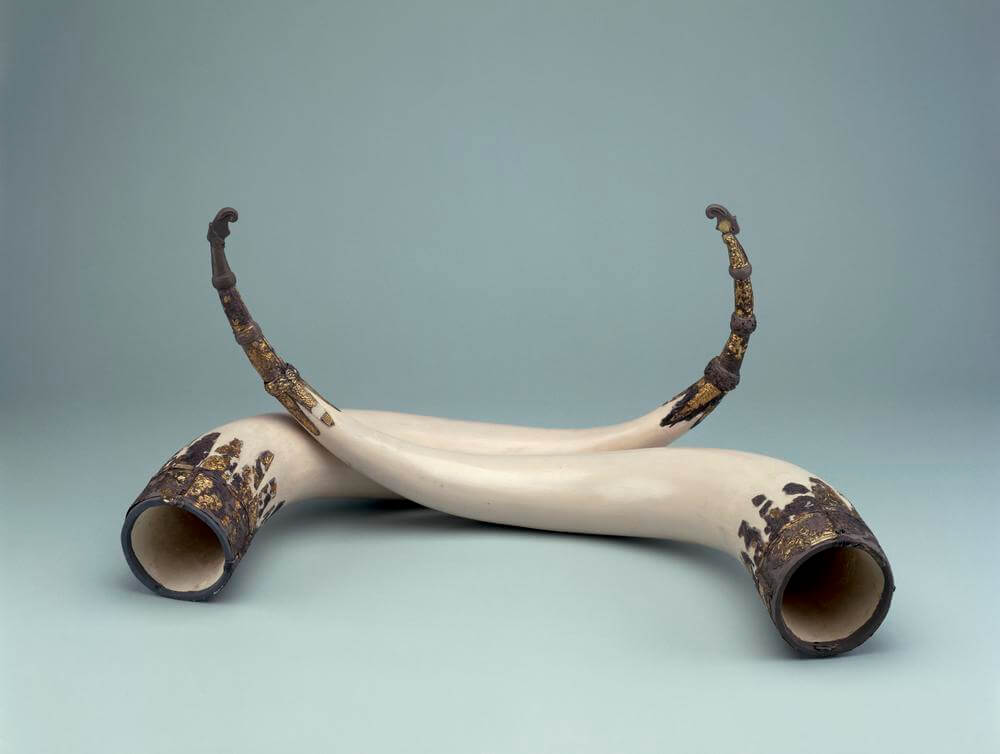
(Some mead horns found at Sutton Hoo, an Anglo-Saxon burial ground)
But we also see evidence of mead in the archeological record. Even after thousands of years, we are able to find traces of mead in pottery by looking for the organic compounds that make up honey, fruit, and fermentation. Check out this excavation of a Viking drinking hall found in the Orkney Islands of Scotland, or these brewers who recreated a 2,500-year-old mead recipe from a bronze cauldron found in southwest Germany.
Why Did Vikings Drink Mead?
For most of history, fresh and clean water has been a very limited resource. Many cultures throughout history have turned to alcohol because it was sterile and it provided good caloric value at times when food might be harder to come by.
But for Vikings, mead wasn't just about the safety or the calories. They could get those from beer - and they did. Mead had a religious and socially valuable place in Viking society too. Vikings loved to feast. But mead wasn't for your everyday feasting. Since it was a lot more valuable (collecting honey in those days was not always an easy task, even for apiarists!), mead came out for important events: weddings, truces, and celebrations with important people.
And for the final reason? Well, just look further up this article - back to the previous section.
Vikings LOVED poetry.
Since mead often had a higher ABV% than the beers they were brewing in those days, mead had the power to turn any man into a poet. To understand this on a deeper level, you must learn a little bit about mead's origin in Norse mythology.
Mead's Mythological Norse Origin
We used a quote above from Snorri Snurlson's Prose Edda. But here's the full tale of the mead of poetry:
After the end of the great war between the Aesir and the Vanir (the two factions of Norse gods), the gods sealed their truce by spitting into a large cauldron - sort of like that one found in Germany. From the amalgamation of their spit, they created the man Kvasir.
Kvasir was the wisest man in the world and he contained the knowledge of all of the gods. There were no questions he could not answer. And he was very generous too, because he traveled the world giving all of that knowledge to mankind.
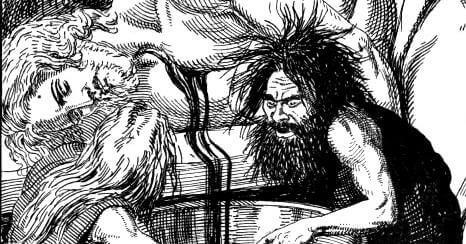
(Fjalar and Galar murder Kvasir, courtesy of Nordic Culture)
But one day, his kindness was taken advantage of and he was murdered by the dwarves, Fjalar and Galar. Fjalar and Galar took his blood and poured it into two vats and a pot. They mixed all of that blood with honey and from it, brewed a mead so powerful that it could turn any person who drank it into a poet or a scholar - a skald.
Fjalar and Galar hid their crime, telling the gods that Kvasir had been suffocated from all the knowledge he was given. But then, they got cocky.
They went out and killed a couple of giants - Gilling and his wife. Suttungr, who was the son of Gilling and his wife, found out what happened and was determined to enact his vengeance. He trapped the dwarves on a reef as the tide was coming in. They plead with him for their lives, and wound up bribing him to save them by offering him the mead they made with Kvasir's blood.
Gilling accepted this mead, took it home, and left it with his daughter, Gunnlod, who was supposed to guard it.
And That's When Odin Showed Up
Meanwhile, word was getting out about the mead and Odin decided he needed to find it. In disguise, he went to the field of Baugi, Suttungr's brother, where nine thralls were scything hay. He tricked them into killing each other over his amazing whetstone (kind of rude, don't you think?) and then told Baugi he would work in his fields in exchange for a draught of Suttungr's mead. He worked for Baugi for an entire summer, then asked for his due that winter. They both went to Suttungr's holdings to ask for the beverage but were denied.
Odin would not be dissuaded. He convinced Baugi to trick his brother by drilling into the side of Suttungr's mountain. Once the hole was made, Odin disguised himself as a snake and slipped in. Baugi attempted to kill him, realizing he had been deceived.
Lucky for Odin, Suttungr was not at home when he arrived, but Gunnlod was. Odin spent three nights with her, and each night, asked Gunnlod for a draught of mead. But each sip he took, he swallowed the entire container, keeping it in his mouth.
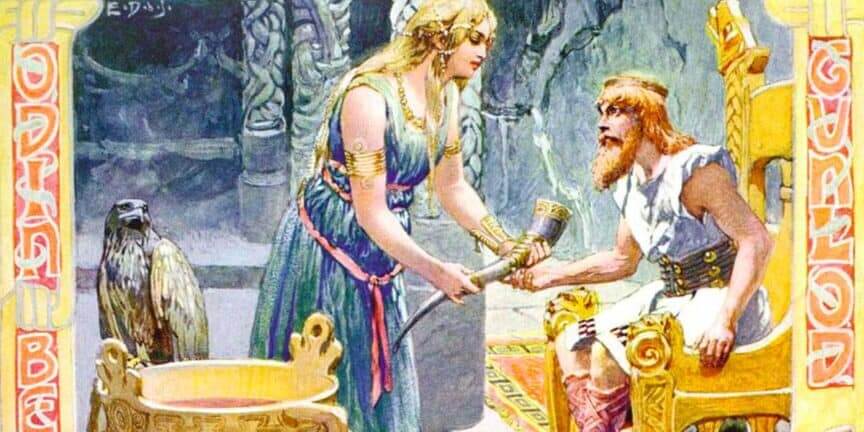
(Gunnlod gives Odin mead, courtesy of Nordic Culture)
After he collected all of the mead, he transformed into an eagle and flew away. Suttungr chased him, also turning into an eagle. Odin flew in haste towards Asgard, where all the gods were setting up vessels to catch the mead.
As he arrived, Odin spat the mead of poetry into these vessels, but at one point, Suttungr came so close to him, that he shot a little out of his butt. That part is known as the skáldfífla hlutr, or the rhymester's share. It's meant for inferior poets.
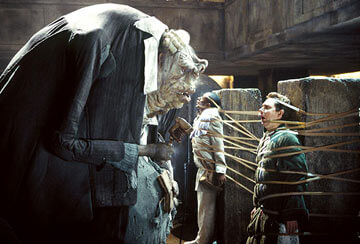
(These guys definitely chugged some of Odin's butt mead.)
But the rest of that mead was meted out only to the gods and the best skalds in all the world.
Conclusion
Yes, Vikings drank mead! We know this because they told us and showed us how it was an important part of their health, religion, and society.
Hey - before you go, did you know that our Grimfrost meads are based on some ancient Swedish recipes? We came up with them with help from some of Grimfrost's staff:
$19.99
Grimfrost is a Swedish company and a global community that builds a bridge between the past and the present. With this mead, Grimfrost continues this mission by venturing back to the world of our Viking forebears, when mead was considered to… read more
$19.99
Grimfrost is a Swedish company and a global community that builds a bridge between the past and the present. With this mead, Grimfrost continues this mission by venturing back to the world of our Viking forebears, when mead was considered to… read more
$19.99
Grimfrost is a Swedish company and a global community that builds a bridge between the past and the present. With this mead, Grimfrost continues this mission by venturing back to the world of our Viking forebears, when mead was considered to… read moreHerja Oak-Aged Wildflower Honey Mead by Grimfrost
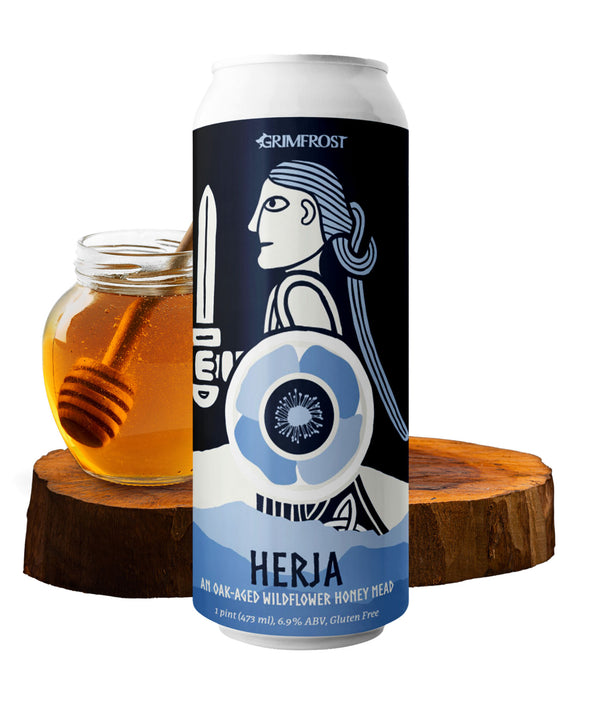
Varangian Rosehip & Spice Mead by Grimfrost

Draki Black Currant Mead by Grimfrost


